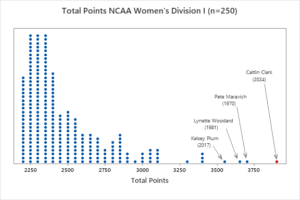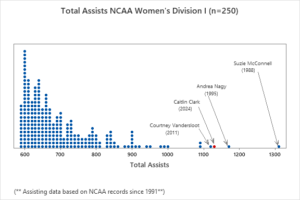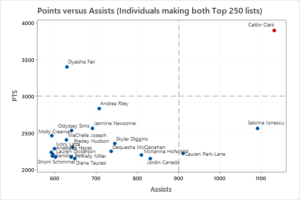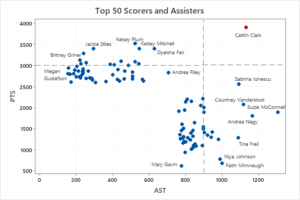Caitlin Clark: Elite Scorer-Elite Passer True Unicorn
By Dean De Cock
April 4, 2024, 8:00 am (CDT)
The Scorer
Caitlin Clark’s pursuit of the Women’s and All-time NCAA scoring records this season has captivated the nation. As the season has progressed, she has methodically surpassed the individuals above her until March 3, 2024, when she finally passed Pete Maravich’s all-time scoring record of 3667 points. One question of interest is how significant of an accomplishment is achieving these various records and milestones. Records are broken regularly in modern day sports and is setting the scoring record really an achievement? Is the level of attention that Clark has garnered this season in agreement with what she is trying to accomplish? In general, the longer a record stands the more impressive it seems when it is broken. From that standpoint, Clark’s surpassing of Kelsey Plum’s NCAA Division-I Women’s scoring record of 3527 points could be interpreted as a rather trivial accomplishment as Plum only recently set that record in 2017, giving the implication that it could easily be broken again soon. On the other hand, breaking Pete Maravich’s all-time scoring record of 3667 appears to be an incredible feat as it had stood untouched for 54 years. How could 140 points, something Clark could typically amass in 4 or 5 games, appear to yield such different relevance? A review of the top 250 NCAA Women’s scorers (along with Pete Maravich and AIAW scoring leader Lynette Woodard) reveals the true significance of Clark’s accomplishments.

(** Scoring data are based on NCAA records since 1981**)
An initial evaluation reveals that although Kelsey Plum’s record is recent, it is still a very significant accomplishment. Amongst top women scorers, a career total of 2200 is relatively common. Scorers who achieve more than 2500 points are relatively rare, while only a handful of individuals have ever scored more than 3000 points. To achieve these high totals, players must consistently play at the top of their game day in and day out, from game to game, and season to season throughout their college career. Under these conditions, the several hundred points differentiating these elite athletes can be very difficult to achieve. The realization that a couple of hundred points can separate the truly elite players from the others brings to the forefront the dilemma of variation in the number of minutes and games played during a career and the conditions under which the individual participated. Many are quick to note the Maravich achieved his record in 3 years while playing without the opportunity of a 3-point shot. In some ways Clark beating his record while having access to an additional year of play and utilizing numerous 3-point shots seems slightly disingenuous but records are lines in the sand and if we start attaching conditions and stipulations to records, things become overly complicated. Other criteria addressing some of these issues could be used to determine the greatest scorer (such as pts/game or pts/min) but total career points is a common straightforward metric, whose definition leaves little room for debate, and Caitlin Clark has that record.
The Assister
While being the greatest scorer in NCAA history is an incredible achievement, it isn’t what sets Caitlin Clark apart from other basketball players. The aspect of her game that hasn’t garnered nearly the attention of her scoring prowess is her passing abilities. It’s not to say that her passing has gone unnoticed, sports analysts often mention her acute passing ability when discussing her scoring, and opposing coaches often mention the difficulties in defending her as focusing too much on stopping her scoring opens opportunities for her teammates, but her passing abilities have not been the focus of the media attention.
There are likely two primary reasons that Clark’s passing abilities haven’t been showcased this season. The first being that quality passing does not elicit the excitement for most people that scoring does. Although threading the needle through 3 defenders to a cutting teammate leading to a perfect layup can be extremely difficult and aesthetically beautiful, it doesn’t elicit the same excitement for most fans that a long range 3 pointer from the logo provokes. Being an excellent assister does not hold the attention of the common fan, and while true basketball aficionados can likely name the best historical NCAA assisters, most fans probably can’t name the current record holder or even name more than one individual in the top ten. The second reason for a lack of focus is that Clark cannot realistically beat the NCAA Women’s assist record given the number of games she has left in her NCAA career. While she is currently leading the nation with 8.9 assists/game this season, her 1132 total assists puts her 34 assists away from breaking Andrea Nagy’s 1165 mark for second place and puts her 176 assists away from breaking Suzie McConnell’s 1307 (with only 2 games left in her career at best). Although she won’t graduate as the highest assist leader in the NCAA, we do know that she is relatively high on the list as on December 30, 2023 she became the first individual to have 3000 points, 900 assists, and 800 rebounds for either men or women. Additionally, on February 11, 2024 she achieved 1000 assists making her the only NCAA player to have both 3000 points and 1000 assists in their career. Evaluating the top 250 NCAA Women’s assisters reveals the significance of Clark’s passing abilities.

Clark currently holds the third highest assist total amongst NCAA Women. To determine how rare it is for a high scorer to have that many assists, we can begin by comparing Clark’s 1132 total assists with Plum, Woodard, and Maravich which are 523, 432, & 425 respectively (none of which would make the top 250 criteria for women). The fact that none of the other top scorers mentioned earlier have enough assists to make the top 250 assisters indicates there may not be a strong relationship between the two skills. In terms of metrics, it might be reasonable to assume that points and assists would be negatively related as a player must choose in their limited interactions with the ball whether they want to score themselves or whether they want to help a teammate score.
The Player
In order to evaluate Clark’s ability as both a scorer and passer we can review all of the women players who reside on both the top 250 for points and assists. Amongst the hundreds of players residing on the top 250 lists, there are only 21 individuals who managed to be on both. When looking at the point totals for individuals who are both strong scorers and passers, Caitlin Clark is of course number one and the next highest scorer is Dyaisha Fair (who executed a covid option 5th year) who is 497 points and 503 assists behind Clark. When looking at the assists total, surprisingly Caitlin Clark also has the most assists, beating out Sabrina Ionescu by 41 assists. Although their assists are virtually the same, Clark has already amassed over 1200 points more than Ionescu did during her college career. This indicates that her passing prowess far exceeds the next best scorer and her scoring prowess far exceeds the next best passer (for all individuals residing in both the top 250 categories).

| Player | PTS* | AST | Yrs | Player | AST* | PTS | Yrs | |
| Caitlin Clark | 3900 | 1132 | 21-24 | Caitlin Clark | 1132 | 3900 | 21-24 | |
| Dyaisha Fair | 3403 | 629 | 20-24 | Sabrina Ionescu | 1091 | 2562 | 17-20 | |
| Andrea Riley | 2835 | 707 | 07-10 | Lauren Park-Lane | 911 | 2226 | 20-24 | |
| Jasmine Newsome | 2566 | 691 | 11-14 | Jordin Canada | 831 | 2153 | 15-18 | |
| Sabrina Ionescu | 2562 | 1091 | 17-20 | McKenna Hofschild | 810 | 2200 | 20-24 | |
| Odyssey Sims | 2533 | 641 | 11-14 | Skylar Diggins | 745 | 2357 | 10-13 | |
| Molly Creamer | 2462 | 593 | 00-03 | Dequesha McClanahan | 737 | 2254 | 11-14 | |
| MaChelle Joseph | 2405 | 628 | 89-92 | Andrea Riley | 707 | 2835 | 07-10 | |
| Skylar Diggins | 2357 | 745 | 10-13 | Jasmine Newsome | 691 | 2566 | 11-14 | |
| Presley Hudson | 2309 | 643 | 16-19 | Diana Taurasi | 648 | 2156 | 01-04 | |
| Ivory Latta | 2285 | 599 | 04-07 | Presley Hudson | 643 | 2309 | 16-19 | |
| Dequesha McClanahan | 2254 | 737 | 11-14 | Odyssey Sims | 641 | 2533 | 11-14 | |
| Anastasia Hayes | 2237 | 592 | 18-23 | Kelly Miller | 639 | 2177 | 98-01 | |
| Lauren Park-Lane | 2226 | 911 | 20-24 | Dyaisha Fair | 629 | 3403 | 20-24 | |
| Lauren Dickerson | 2208 | 595 | 17-20 | MaChelle Joseph | 628 | 2405 | 89-92 | |
| McKenna Hofschild | 2200 | 810 | 20-24 | Shoni Schimmel | 601 | 2174 | 11-14 | |
| Kenisha Bell | 2187 | 594 | 15-19 | Ivory Latta | 599 | 2285 | 04-07 | |
| Kelly Miller | 2177 | 639 | 98-01 | Lauren Dickerson | 595 | 2208 | 17-20 | |
| Shoni Schimmel | 2174 | 601 | 11-14 | Kenisha Bell | 594 | 2187 | 15-19 | |
| Diana Taurasi | 2156 | 648 | 01-04 | Molly Creamer | 593 | 2462 | 00-03 | |
| Jordin Canada | 2153 | 831 | 15-18 | Anastasia Hayes | 592 | 2237 | 18-23 |
It is noteworthy that Sabrina Ionescu with her balance of passing, scoring and rebounding holds the NCAA Division I record for triple doubles for both men and women at 26 and Caitlin Clark is a distant second place with 17. Limiting the comparisons to only the 21 individuals appearing on both lists does not give a full picture of the typical points and assists for elite players. Expanding this analysis to consider all of the top 50 scorers and 50 assisters gives a better picture of Clark’s unusual set of skills.

Of the 100 potential players residing on either the top scorer or top assister lists, there is only one player who managed to be both a top 50 scorer and top 50 passer, Caitlin Clark (resulting in 99 individuals being displayed here). The spread in the elite scores is fairly tight with the majority of individuals scoring between 2500 to 3000 points. Whereas, the variation of assists within the scoring group is relatively large. If we exclude Caitlin Clark, the assists run from 154 (Megan Gustafson) to 707 (Andrea Riley). Viewing the data from the elite assists standpoint offers a similar result with the majority of individuals displaying a tight distribution of 750 to 900 assists, while scoring varied widely from 627 (Mary Gavin) to 2562 (Sabrina Ionescu). Looking at the high scorer group, we see little to no relationship between their scoring and assisting totals indicating that the two skills seem unrelated to each other. Looking at the high assisting group yields the same results with assist proficiency seemingly unrelated to scoring success. Knowing that an individual is an elite scorer gives little information on whether they will also be an excellent assister (and vice versa). This analysis along with the fact that Caitlin Clark is the only individual within both groups indicates that elite players tend to be scorers or assisters and that being able to excel in both categories is extremely rare. Interestingly, Clark’s superiority in the non-dominant skill is relatively equal in both groups. For the elite scorers, the average assists is 363 indicating Clark’s assist ability (1132) is 3 times greater than the average elite scorer. Looking at the elite assisters, we find their average scoring is 1510 making Clark’s 3900 nearly 2.5 times greater than the typical elite assister. When considering this combination of skills simultaneously, Clarks metrics put her alone in the 3000 point – 900 assist club with no other player coming close to her combined abilities.
Never Again
It was mentioned earlier that records are made to be broken and Caitlin Clark’s scoring record is destined to eventually fall. Ju Ju Watkins is already on pace to be that individual, but if it isn’t her, there will be an endless line of challengers over the upcoming years and eventually someone else will wear the scoring crown. This analysis shows, though, that Clark’s scoring record isn’t what makes her special. Achieving the scoring record simply showed that she was incrementally better than all the other scorers that came before her. What makes Caitlin Clark truly unique amongst college athletes is her singular position of being the only truly elite scorer and passer in college basketball. The offhand mention of her inclusion as the only member of the “3000 point-1000 assist club” does not do justice to the magnificence of that achievement. Those particular numbers are just arbitrary lines in the sand that are easy for individuals to envision. Knowing that she is the only person to cross those thresholds indicates something special about her but does not really illustrate the significance of that feat. Without context, we might believe that there are numerous players hovering just outside of those particular limits. Only by looking at the accomplishment of the best women college players of all time and evaluating them under those criteria, can we see her uniqueness.
Clark routinely achieves 3 to 4 times the number of points that an elite passer typically contributes during a game, while simultaneously doubling the number of assists that an elite scorer produces. For her career, Clark has almost 600 more assists than the second highest scorer in women’s college basketball, while simultaneously having almost 2000 more points than the best assister. Evaluating the top 50 individuals in both categories shows that no one is lurking in the shadows just outside those boundaries waiting to join Clark in the 3000-1000 club. Her position in that club is unchallenged and is so extreme that even if all of the elite athletes evaluated here were given an additional year to accumulate more points and assists, only a handful of individuals could potentially join her in the 3000-1000 club and none of those individuals could realistically top her achievements in both points and assists simultaneously. Caitlin Clark is a true unicorn amongst college athletes and although her scoring record may eventually fall, she will likely remain alone on her balanced shooter-passer pedestal for decades to come.
Data Sources
http://fs.ncaa.org/Docs/stats/w_basketball_RB/2023/D1.pdf
https://www.ncaa.com/stats/basketball-women/d1
https://www.sports-reference.com/cbb/
Notes on historical NCAA Yearly Team Statistics Reports:
Pre-1985 contain Field Goals, Free Throws, Rebounds
1985-1987 contain Field Goals, Free Throws, Rebounds, Assists
1988-post contain Total Field Goals, 3-pt Field Goals, Free Throws, Rebounds, Assists, Blocks, Steals